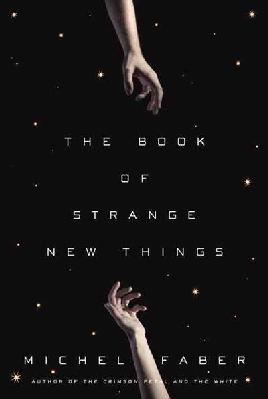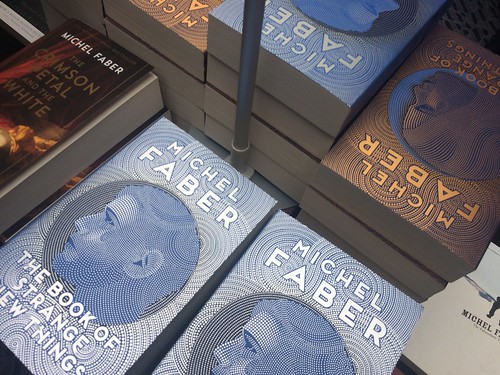Michel Faber's novels defy easy categorisation. He has written in genres as varied as historical fiction (his novel The crimson petal and the white, is set in Victorian London), horror, and science fiction.
Born in the Netherlands, Faber's family moved to Australia when he was 7 years old, and he describes himself as something of an outsider, an alien, an outlier. He now lives in Scotland, which for a migraine sufferer, has a much more overcast and hospitable environment.
When he sat down to talk at the Auckland Writers Festival with Kiwi writer Paula Morris about his work (and life), I was woefully unprepared for how raw and heartbreaking the conversation would become.
 This unexpected poignancy was largely due to his discussion of the loss of his wife Eva, who died in 2014 from cancer. Her diagnosis was made while he was writing his latest (and what he claims will be his last) novel, The book of strange new things, and he admitted that her illness had an affect on how the book developed. The novel has a dystopian, futuristic setting, with a pastor sent to a far-off planet to minister to the indigenous population there. He is separated from his wife and themes of love and loss permeate the tale.
This unexpected poignancy was largely due to his discussion of the loss of his wife Eva, who died in 2014 from cancer. Her diagnosis was made while he was writing his latest (and what he claims will be his last) novel, The book of strange new things, and he admitted that her illness had an affect on how the book developed. The novel has a dystopian, futuristic setting, with a pastor sent to a far-off planet to minister to the indigenous population there. He is separated from his wife and themes of love and loss permeate the tale.
Although the setting is sci-fi one, this Faber says, is just "the furniture", and to some degree is there for the entertainment aspect. At its heart the story is about human beings, faith and love. Though he lost his faith himself when he was 11, he still feels that religion has a purpose for being and he's interested in what it gives to people.
Religion is intrinsically ridiculous but there is a reason that people have needed it.

Regarding the adaptations of his books for the screen, he was very happy with The Crimson Petal and the White, and on such good terms with the star Romola Garai that he stayed at her house at one point when they needed to be in London for treatment for Eva. He's even happier with the film version of Under the Skin, starring Scarlett Johansson.
His feeling regarding literary fiction is that it should be interesting and entertaining as well and that's what he tries to achieve with this books. There's a risk, he says, that literary authors will write for the entertainment of other literary authors thus forcing ordinary readers towards entertaining but not very good fiction, that doesn't give them anything of depth.
He doesn't want people to regret, after several hundred pages, reading his books - "how pointless is that?"
There is actually nothing worse than a really dull work of literary fiction.
Shortly after the session started, a member of staff appeared carrying a pair of red women's ankle boots. They were placed next to Faber's chair, he uttered a quick thank you and carried on with what he was saying. Later on as Paula Morris asked him about what Faber would be working on in the future, since no more novels were in the pipeline, he talked about the projects that involved his wife and explained the mystery of the red boots.
His next projects will be working on Eva's unfinished short stories as well as writing a biography of her life, not for publication, but for the family. As for the boots, he was taking them to parts of the world to which she had never gone and taking pictures of them in contexts in which he thought she'd be happy...
Then he read several poems from a new book called "Undying" (due out in July) which deals with Eva's illness, her death, and the grieving process. And this was when everyone started crying. In particular, the poem "You were ugly" which describes the physical changes to Eva's appearance in illness is brutally honest and heartbreaking with its revelation that after death those changes are forgotten, that her beauty returns. Even Paula Morris was seen to be dabbing her eyes after that one.
Find out more
- Titles by Michel Faber in our catalogue
- Find out more about the Auckland Writers Festival 2016
- Browse all our Auckland Writers Festival posts
- Read Masha, Moata and Roberta’s Auckland Writers Festival 2016 recommended booklist
- See photos from the Festival




Add a comment to: Making literary fiction exciting: Michel Faber – Auckland Writers Festival 2016